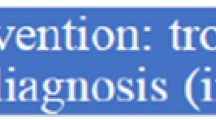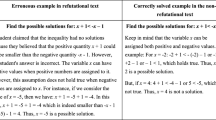Abstract
This paper reports on a study of learning with erroneous examples, mathematical problems presented to students in which one or more of the steps are incorrect. It is hypothesized that such examples can deepen student understanding of mathematics content, yet very few empirical studies have tested this in classrooms settings. In a classroom study, 255 6th, 7th, and 8th graders learned about decimals using a web-based system under one of three conditions – erroneous examples, worked examples, and partially-supported problem solving. Although students’ performance improved significantly from pretest to posttest the learning effect for erroneous examples was not better than the other conditions, and unlike some earlier empirical work, the higher prior knowledge students did not benefit more from erroneous examples than from worked examples or problem solving. On the other hand, we were able to identify certain key decimal misconceptions that are held by a high percentage of students, confirming earlier mathematics education studies. Also, the incidence of misconceptions declined over the course of the lesson, especially for the worked example group. Overall, these results could indicate that erroneous examples are simply not as effective for learning as we (and other) researchers hypothesize. The results could also indicate that the manner in which erroneous examples were presented to the students in this study somehow missed the mark in promoting learning. It is also possible that erroneous examples, like some other e-learning techniques, do not work as well in classroom as they do in a laboratory setting. We discuss these possibilities and how we are redesigning the treatments to be more focused and appealing to learners for a subsequent study.
Access this chapter
Tax calculation will be finalised at checkout
Purchases are for personal use only
Preview
Unable to display preview. Download preview PDF.
Similar content being viewed by others
References
National Math Panel Report (2008), http://www2.ed.gov/about/bdscomm/list/mathpanel/report/final-report.pdf
Glasgow, R., Ragan, G., Fields, W.M., Reys, R., Wasman, D.: The decimal dilemma. Teaching Children Mathematics 7, 89–93 (2000)
Rittle-Johnson, B., Siegler, R.S., Alibali, M.W.: Developing conceptual understanding and procedural skill in mathematics: An iterative process. Journal of Educational Psychology 93(2), 346–362 (2001)
Stacey, K., Steinle, V.: Refining the classification of students’ interpretations of decimal notation. Hiroshima Journal of Mathematics Education 6, 49–69 (1998)
Putt, I.J.: Preservice teachers ordering of decimal numbers: When more is smaller and less is larger! Focus on Learning Problems in Mathematics 17(3), 1–15 (1995)
Grosse, C.S., Renkl, A.: Finding and fixing errors in worked examples: Can this foster learning outcomes? Learning and Instruction 17(6), 612–634 (2007)
Tsovaltzi, D., Melis, E., McLaren, B.M., Meyer, A.-K., Dietrich, M., Goguadze, G.: Learning from Erroneous Examples: When and How Do Students Benefit from Them? In: Wolpers, M., Kirschner, P.A., Scheffel, M., Lindstaedt, S., Dimitrova, V. (eds.) EC-TEL 2010. LNCS, vol. 6383, pp. 357–373. Springer, Heidelberg (2010)
Borasi, R.: Exploring mathematics through the analysis of errors. For the Learning of Mathematics: An Int. Journal of Mathematics Education 7(3), 2–8 (1987)
OECD. Knowledge and Skills for Life. First Results from PISA 2000, Paris (2001)
Bransford, J., Brown, A.L., Cocking, R.R.: How People Learn: Brain, Mind, Experience, and School. National Academy Press, Washington, D.C (1999)
Skinner, B.F.: The Technology of Teaching. Appleton-Century-Crofts, New York (1968)
Tsamir, P., Tirosh, D.: In-service mathematics teachers’ views of errors in the classroom. In: International Symposium: Elementary Mathematics Teaching (2003)
Siegler, R.S.: Microgenetic studies of self-explanation. In: Granott, N., Parziale, J. (eds.) Microdevelopment, Transition Processes in Development and Learning, pp. 31–58. Cambridge University Press, Cambridge (2002)
Durkin, K., Rittle-Johnson, B.: The effectiveness of comparing correct and incorrect examples for learning about decimal magnitude. The Journal of Experimental Child Psychology (submitted)
Kopp, V., Stark, R., Fischer, M.R.: Fostering diagnostic knowledge through computer-supported, case-based worked examples: Effects of erroneous examples and feedback. Medical Education 42, 823–829 (2008)
Melis, E.: Design of erroneous examples for ActiveMath. In: Proceedings of the Int. Conference on Artificial Intelligence in Education, pp. 451–458. IOS Press, Amsterdam (2005)
Brueckner, L.J.: Analysis of Difficulties in Decimals. Elementary School Journal 29, 32–41 (1928)
Graeber, A., Tirosh, D.: Multiplication and division involving decimals: Preservice elementary teachers’ performance and beliefs. Journal of Mathematics Behavior 7, 263–280 (1988)
Hiebert, J.: Analysis of arithmetic for mathematics teaching. In: Mathematical, Cognitive, and Instructional Analyses of Decimal Fractions, ch. 5, pp. 283–322. Lawrence Erlbaum, Mahwah (1992)
Irwin, K.C.: Using everyday knowledge of decimals to enhance understanding. Journal for Research in Mathematics Education 32(4), 399–420 (2001)
Resnick, L.B., Nesher, P., Leonard, F., Magone, M., Omanson, S., Peled, I.: Conceptual bases of arithmetic errors: The case of decimal fractions. Journal for Research in Mathematics Education 20(1), 8–27 (1989)
Isotani, S., McLaren, B.M., Altman, M.: Towards Intelligent Tutoring with Erroneous Examples: A Taxonomy of Decimal Misconceptions. In: Aleven, V., Kay, J., Mostow, J. (eds.) ITS 2010. LNCS, vol. 6095, pp. 346–348. Springer, Heidelberg (2010)
Bell, A., Swan, M., Taylor, G.: Choice of operations in verbal problems with decimal numbers. Educational Studies in Mathematics 12, 399–420 (1981)
Fischbein, E., Deri, M., Nello, M., Marino, M.: The role of implicit models in solving verbal problems in multiplication and division. Journal of Research in Mathematics Education 16, 3–17 (1985)
Ohlsson, S.: Learning from performance errors. Psychological Review 103(2), 241–262 (1996)
Aleven, V., McLaren, B.M., Sewall, J., Koedinger, K.R.: The Cognitive Tutor Authoring Tools (CTAT): Preliminary Evaluation of Efficiency Gains. In: Ikeda, M., Ashley, K.D., Chan, T.-W. (eds.) ITS 2006. LNCS, vol. 4053, pp. 61–70. Springer, Heidelberg (2006)
Baker, R.S., Corbett, A.T., Koedinger, K.R., Wagner, A.Z.: Off-Task Behavior in the Cognitive Tutor Classroom: When Students “Game The System”. In: Proceedings of ACM CHI Computer-Human Interaction, pp. 383–390 (2004)
Author information
Authors and Affiliations
Editor information
Editors and Affiliations
Rights and permissions
Copyright information
© 2011 Springer-Verlag Berlin Heidelberg
About this paper
Cite this paper
Isotani, S., Adams, D., Mayer, R.E., Durkin, K., Rittle-Johnson, B., McLaren, B.M. (2011). Can Erroneous Examples Help Middle-School Students Learn Decimals?. In: Kloos, C.D., Gillet, D., Crespo García, R.M., Wild, F., Wolpers, M. (eds) Towards Ubiquitous Learning. EC-TEL 2011. Lecture Notes in Computer Science, vol 6964. Springer, Berlin, Heidelberg. https://doi.org/10.1007/978-3-642-23985-4_15
Download citation
DOI: https://doi.org/10.1007/978-3-642-23985-4_15
Publisher Name: Springer, Berlin, Heidelberg
Print ISBN: 978-3-642-23984-7
Online ISBN: 978-3-642-23985-4
eBook Packages: Computer ScienceComputer Science (R0)




